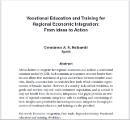| dc.contributor.author | Constance, A. N. Nsibambi | |
| dc.date.accessioned | 2024-02-02T09:05:02Z | |
| dc.date.available | 2024-02-02T09:05:02Z | |
| dc.date.issued | 2014 | |
| dc.identifier.citation | Nsibambi, C. A. (2014). Vocational Education and Training for Regional Economic Integration: From Ideas to Action. International Journal of Vocational Education and Training Volume, 22, 16-25. | en_US |
| dc.identifier.uri | https://hdl.handle.net/20.500.12504/1585 | |
| dc.description.abstract | Africa desires to integrate her regional economies and achieve a continental
common market by 2028. Such economic arrangement removes border barriers and allows free movement of goods and services between member countries. Ideally, countries have unrestricted free trade which maximize opportunities of broader market. However, if a country lacks skilled workforce, its goods and services may not meet consumers’ expectation, and as a result it
may not benefit from the economic integration. his paper provides an overview of regional economic integration with its enabling and constraining effects. Insights into potential for increasing economic integration through promotion of vocational education and training are also provided. | en_US |
| dc.language.iso | en | en_US |
| dc.publisher | International Journal of Vocational Education and Training | en_US |
| dc.subject | Economic integration | en_US |
| dc.subject | Free trade | en_US |
| dc.subject | Regional economy | en_US |
| dc.subject | Vocational education and training | en_US |
| dc.title | Vocational education and training for regional economic integration: from ideas to action | en_US |
| dc.type | Article | en_US |

